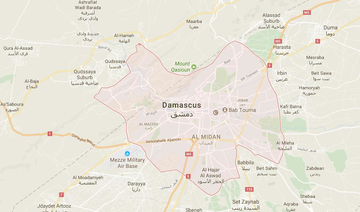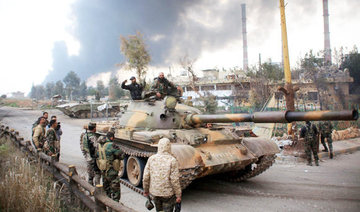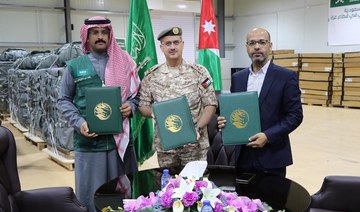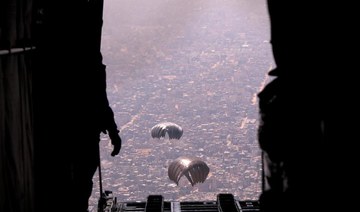BEIRUT: Daesh on Tuesday claimed responsibility for a pair of suicide bombings in the Syrian capital that killed 17 civilians and policemen the previous day.
In Monday’s bombings, two men attacked a police station in the Al-Midan neighborhood with several bombs, before one of them blew himself up, according to Syria’s Interior Minister Lt. Gen. Mohammad Al-Shaar. He said the other bomber made it inside the compound, where police killed him, causing his bomb to explode.
The blasts damaged the lower floors of the building, and shattered the windows along one side. Blood stained the floors.
Daesh’s Aamaq news agency said the militant group carried out the Al-Midan attack. The statement carried by the agency gave no other details.
The Syrian Army, backed by Russia, is at war with Daesh as well as a local Al-Qaeda affiliate and an array of rebel groups trying to oust President Bashar Assad. The military has been steadily claiming territory from Daesh in central and eastern Syria recently.
Also on Tuesday, Russia’s military said its airstrikes in eastern Syria this week killed more than 300 Daesh militants.
Russia has been a major backer of Syria’s President Bashar Assad whose government troops have been advancing in the eastern province of Deir Ezzor against Daesh under the cover of Russian airstrikes.
Meanwhile, the Kurdish-led Syrian Democratic Forces are also marching against the Daesh group, backed by the US-led coalition.
Russia’s Defense Ministry said in a statement early on Tuesday that its airstrikes just outside Deir Ezzor, on the eastern bank of the Euphrates River, killed more than 304 Daesh fighters and left more than 200 wounded.
The ministry said the airstrikes also hit and destroyed a Daesh training center, as well artillery positions, tanks and ammunition depots belonging to the militants.
Assad winning Syria war, says Israel
Israel’s defense minister said on Tuesday Assad was winning Syria’s civil war and urged the US to weigh in as Damascus’s Iranian and Hezbollah allies gain ground.
Avigdor Lieberman’s comments marked a reversal for Israel, where top officials had from the outset of fighting in 2011 until mid-2015 regularly predicted Assad would lose control of his country and be toppled.
“I see a long international queue lining up to woo Assad, include Western nations, including moderate Sunnis. Suddenly everyone wants to get close to Assad,” Lieberman told Israel’s Walla news site in an interview.
In late 2015, Russia helped Assad turn the tide with a military intervention that put Moscow’s forces in the field alongside Israel’s most potent foes — Iran and the Lebanese guerrilla group Hezbollah — opposite Syrian rebels.
The US has focused its Syria operations on fighting rebel militants like Daesh — dismaying Israel, which has tried to persuade both Washington and Moscow that Iran’s expanding clout is the greater threat.
In its decades under Assad family rule, Syria has been an enemy of Israel, with their armies clashing in 1948, 1967, 1973 and 1982. While largely keeping out of the Syrian civil war, Israel has tried to sway the world powers involved in the conflict and cautioned it could strike militarily to prevent Iran and Hezbollah entrenching further on its northern front.
“We hope the United States will be more active in the Syrian arena and the Middle East in general,” Lieberman said. “We are faced with Russians, Iranians, and also the Turks and Hezbollah, and this is no simple matter to deal with, on a daily basis.”
Lieberman did not elaborate on what actions he sought from the Donald Trump administration, which Israel has been lobbying for reassurances that Iranian and Hezbollah forces will not be allowed to deploy near its border or set up bases within Syria.
“The United States has quite a few challenges of its own, but as a trend — the more the United States will be active, the better it will be for the State of Israel,” Lieberman said.
Daesh claims deadly suicide attack in Syrian capital
Daesh claims deadly suicide attack in Syrian capital
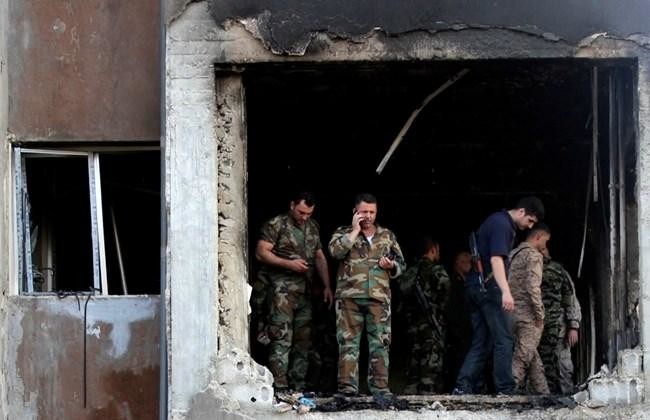
Israel warns of escalation from cross-border fire from Hezbollah

- Hezbollah says it will not halt fire unless Israel stops its military offensive on Gaza
JERUSALEM: Intensified cross-border fire from Lebanon’s Hezbollah movement into Israel could trigger serious escalation, the Israeli military said on Sunday.
“Hezbollah’s increasing aggression is bringing us to the brink of what could be a wider escalation, one that could have devastating consequences for Lebanon and the entire region,” Israeli military spokesperson Rear Admiral Daniel Hagari said in a video statement in English.
Iran-backed Hezbollah last week launched the largest volleys of rockets and drones yet in the eight months it has been exchanging fire with the Israeli military, in parallel with the Gaza war.
After the relatively heavy exchanges over the past week, Sunday saw a marked drop in Hezbollah fire, while the Israeli military said that it had carried out several air strikes against the group in southern Lebanon.
The US and France are working on a negotiated settlement to the hostilities along Lebanon’s southern border. Hezbollah says it will not halt fire unless Israel stops its military offensive on Gaza.
“Israel will take the necessary measures to protect its civilians — until security along our border with Lebanon is restored,” Hagari said.
‘No joy’: Gazans mark somber Eid in shadow of war

- Many Palestinians forced to spend holiday without their loved ones
- I hope the world will put pressure to end the war on us because we are truly dying, and our children are broken
GAZA STRIP: In tents in the stifling heat and bombed-out mosques, Gazans on Sunday marked the start of the Eid Al-Adha holiday, devoid of the usual cheer as the Israel-Hamas war raged on.
“There is no joy. We have been robbed of it,” said Malakiya Salman, a 57-year-old displaced woman now living in a tent in Khan Younis City in the southern Gaza Strip.
Gazans, like Muslims the world over, would usually slaughter sheep for the holiday — whose Arabic name means “feast of the sacrifice” — and share the meat with the needy.
Parents would also give their children new clothes and money for the celebration.
But this year, after more than eight months of a devastating Israeli campaign that has flattened much of Gaza, displaced most of the besieged territory’s 2.4 million people, and sparked repeated warnings of famine, the Eid is a day of misery for many.
“I hope the world will put pressure to end the war on us because we are truly dying, and our children are broken,” said Salman.
Her family was displaced from the far-southern city of Rafah, a recent focus of the fighting which began after Hamas’s Oct. 7 attack on southern Israel.
The military on Sunday morning announced a “tactical pause of military activity” around a Rafah-area route to facilitate the delivery of desperately needed humanitarian aid to Gazans.
AFP correspondents said there were no reports of strikes or shelling since dawn, though the Israeli military stressed there was “no cessation of hostilities in the southern Gaza Strip.”
The brief respite in fighting allowed worshippers a rare moment of calm on holiday.
Many gathered for the Eid Al-Adha morning prayer in the courtyard of Gaza City’s historic Omari Mosque, which was heavily damaged in Israeli bombardment, placing down their frayed prayer mats next to mounds of rubble.
The sound of prayers traveled down some of the city’s destroyed and abandoned streets.
“Since this morning, we’ve felt a sudden calm with no gunfire or bombings ... It’s strange,” said 30-year-old Haitham Al-Ghura from Gaza City.
He hoped the pause meant a permanent ceasefire was near, though truce mediation efforts have stalled for months.
In several areas of the war-battered territory, especially in Gaza City, young boys were seen manning roadside shops selling perfumes, lotions, and other items against the backdrop of piles of rubble from destroyed buildings and homes.
Many vendors used umbrellas to protect themselves from the scorching sun as they sold household items on Gaza City’s main market street. But there were few buyers.
Food and other goods can reach four or five times their usual price, but those who cling to the holiday traditions can still afford them.
In Khan Younis, displaced man Majdi Abdul Raouf spent 4,500 shekels ($1,200) — a small fortune for most Gazans — on a sheep to sacrifice.
“I was determined to buy it despite the high prices, to perform these rituals and bring some joy and happiness to the children in the displacement camp,” said the 60-year-old, who fled his home in Rafah.
“There is sadness, severe pain, and suffering, but I insisted on having a different kind of day.”
The deadliest-ever Gaza war began after Hamas’s unprecedented Oct. 7 attack.
Israel’s retaliatory offensive has killed at least 37,337 people in Gaza, also mostly civilians, according to the Health Ministry in the territory.
For many, a halt in fighting can never bring back what has been lost.
“We’ve lost many people, there’s a lot of destruction,” said Umm Mohammed Al-Katri from Jabalia refugee camp in northern Gaza.
“This Eid is completely different,” she said, with many Gazans forced to spend the holiday without their loved ones killed or displaced during the war.
Grieving families on Sunday flocked to cemeteries and other makeshift burial sites, where wooden planks marked the graves.
“I feel comfort here,” said Khalil Diab Essbiah at the cemetery where his two children are buried.
Even with the constant buzzing of Israeli drones overhead, visitors at the cemetery “can feel relieved of the genocide we are in and the death and destruction,” he said.
Hanaa Abu Jazar, 11, also displaced from Rafah to the tent city in Khan Yunis, said: “We see the (Israeli) occupation killing children, women and the elderly.”
“How can we celebrate?” asked the girl.
Jordan conducts three airdrops in southern Gaza

- Aid packages containing food, clothing, and sweets were delivered to various locations in the southern Gaza
AMMAN: Jordan’s armed forces conducted three airdrops to the southern part of Gaza on Sunday, in collaboration with Egypt, to mark the first day of Eid Al-Adha, Jordan News Agency reported.
Aid packages containing food, clothing, and sweets were delivered to various locations in the southern Gaza Strip by two planes from the Royal Jordanian Air Force and an aircraft from Egypt.
Earlier on Saturday, a 45-truck humanitarian aid convoy arrived in Gaza, sent by the JAF and the Jordan Hashemite Charity Organization (JHCO).
In cooperation with its regional and international allies, the Jordanian armed forces have carried out 261 airdrops and delivered 1,970 trucks of aid since the beginning of Israel’s onslaught on Gaza.
WHO chief Tedros Adhanom Ghebreyesus said that “a significant proportion of Gaza’s population is now facing catastrophic hunger and famine-like conditions,” as Israel continues to impose severe restrictions on the supply of food, water, medicine, and fuel to the Strip.
Kuwait Red Crescent distributes meat to Lebanese families, Syrian, Palestinian refugees

- Initiative follows last week's distribution of Eid Al-Adha packages by the KRCS
LONDON: The Kuwait Red Crescent Society (KRCS) has launched an initiative to distribute meat to around 1,500 Lebanese families, as well as Syrian and Palestinian refugees in Lebanon, in celebration of Eid Al-Adha, Kuwait News Agency reported on Sunday.
Youssef Boutros, relief coordinator of the Lebanese Red Cross (LRC), announced that the distribution process had begun on Sunday.
This initiative follows last week's distribution of Eid Al-Adha packages by the KRCS, which included clothes and other essentials for around 2,000 families, covering Lebanese families and Syrian and Palestinian refugees.
In addition to these efforts, the KRCS is continuing its humanitarian aid to 6,000 Lebanese families in southern Lebanon, who have been affected by military confrontations between Hezbollah and Israel since October.
This aid, which includes food and staple supplies, is being distributed with the assistance of the LRC.
ICC members demand end to ‘intimidation’ so court can carry out work

- Group of 93 states issues statement amid reports of Israeli activities against court
- Call is also in response to the behavior of other countries
LONDON: A group of 93 states has demanded the International Criminal Court be allowed to work “without intimidation” after reports that Israel has been engaged in a nine-year clandestine campaign to undermine it.
In a statement the group said it would work to preserve the court’s “integrity from any political interference and pressure,” amid claims by the office of the ICC’s chief prosecutor, Karim Khan, that it has received threats after he requested arrest warrants for senior Israeli government and Hamas figures, including Israel’s prime minister, Benjamin Netanyahu, and Defense Minister Yoav Gallant.
The statement in defense of the ICC, which called on “all states to ensure full cooperation with the court for it to carry out its important mandate,” was drafted by Belgium, Chile, Jordan, Senegal and Slovenia after “eye-opening” revelations about Israeli intelligence operations against the court published in The Guardian. It was also signed by Western states including Germany, France, Canada and the UK.
A diplomatic source told the paper that the story had “made some (diplomats) realise that it’s time to put out some sort of statement from the states that belong to the court, responding to what has now come to light.”
The source added that the statement was not just aimed at the actions of Israeli intelligence agencies but was also a response to the behavior of other states, including a cyberattack on the ICC last year that came during investigations into senior Russian figures accused of involvement or complicity in crimes committed in Ukraine.
The source told The Guardian: “The court is going after some very powerful people, not just in the Palestine investigation, and it’s time to send a message that the state parties are there to defend it.”
Danya Chaikel, the International Federation for Human Rights’ representative to the ICC, said: “This is a unique moment of international solidarity, with 93 ICC states parties standing up for global justice and accountability for mass atrocities. They are collectively opposing the egregious threats to the court from powerful countries including Israel, the US and Russia, and strongly rejecting their efforts to manipulate the rule of law for political gains.”


